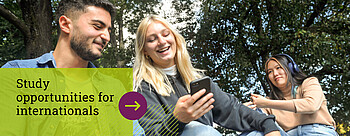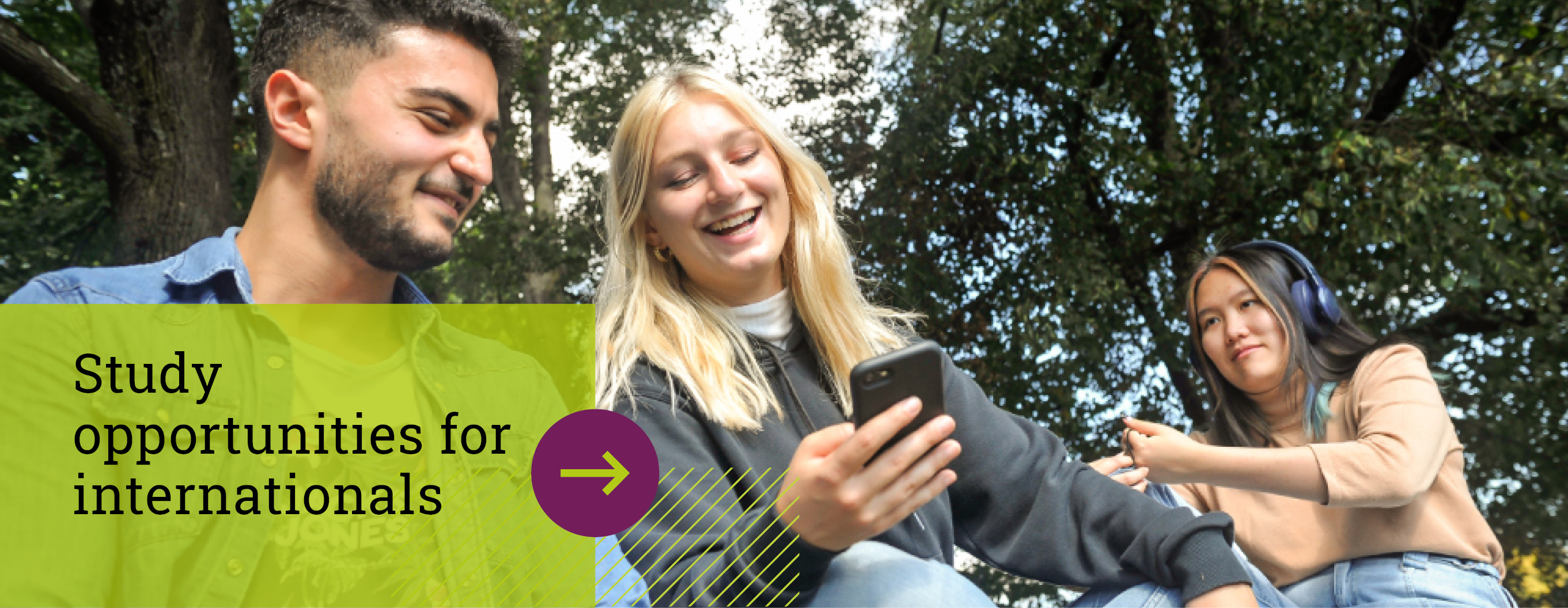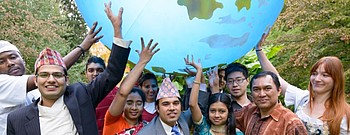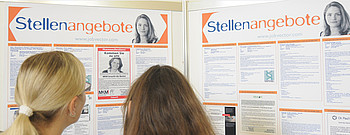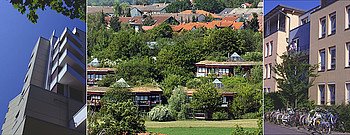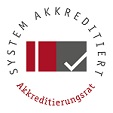Agricultural Sciences (Master’s)
Major: Transformation Management for Sustainable Agri-Food Systems
Shape the transformation for a sustainable future
Agricultural Sciences (Master’s)
Major: Transformation Management for Sustainable Agri-Food Systems
Shape the transformation for a sustainable future
Do you want to assist with the implementation of innovative solutions for a sustainable future? The agri-food sector faces challenges such as climate change, biodiversity loss, and digitalization. At the same time, sustainability goals such as the 2°C target and the Sustainable Development Goals must be achieved. This requires professionals who understand this transformation, can think strategically and with an eye to the future, and can mediate between different social actors and conflicting goals. The Transformation Management for Sustainable Agri-Food Systems major in the Master’s program in Agricultural Sciences trains students for exactly this.
What you can expect:
- Understand sustainability challenges from a systemic perspective
- Learn about the latest theories for understanding social and institutional change processes
- Steer and organize transformation processes
- Recognize different points of view and values and mediate between them
- Reasons to Choose Hohenheim
| Degree Master of Science (M.Sc.) |
4 semesters 120 credits |
Language English |
University places unlimited |
Location Stuttgart |
|||||
Helping to shape sustainability in agricultural and food systems
The 4-semester major contains three compulsory modules on
- Transformation,
- Sustainability, and
- Communication
with a total of 18 ECTS credit points.
For this purpose, you choose two semi-elective modules with a total of 12 ECTS credits from the areas
- Agricultural science,
- Environmental science, or
- Social science.
After that, you can choose elective modules with a total of 60 ECTS credits from the entire wide range of Master’s modules offered by Faculty A. To assist you in planning your studies, profile lines are suggested to you which contain combinations of elective modules that prepare you particularly well for certain professional fields.
You can also integrate a professional internship of 15 or 30 ECTS credits. If you like, you can use the third semester to study abroad. Recognition of the modules taken during the semester abroad is simple.
You want to know more?
Detailed information about the course and structure of the degree program can be downloaded here:
- Curriculum
- Module Catalog [Link follows]
- Examination regulations
- Admission regulations (german | english)
- Department of Sustainable Use of Natural Resources
- Department of Social and Institutional Change in Agricultural Development
Practice developing measures that lead to greater sustainability
The ability to communicate across disciplines and with partners in other sectors, such as policymakers, businesses, civil society organizations, or the general public is best practiced during an internship.
Gaining practical experience
This major has its own Master’s internship module (“Transformation Internship”). You can take this elective module with 15 or 30 ECTS credit points in the summer or winter semester. In addition to the 6-month or 3-month internship period (6 months can be divided into 2 internships of 3 months each), you will prepare a seminar paper and present it in three online seminar sessions (start-mid-end). The seminar part of the module is graded and counts for 12 ECTS credits in the case of a 6-month internship and for 6 ECTS credits in the case of a 3-month internship. The module is open only to students in this major. You can look for an internship in private companies, public institutions, non-governmental organizations, and projects in Germany or abroad that want to develop existing structures, working methods, products, markets, and the like, especially in the area of food production, through intensive measures aiming at greater sustainability.
Expanding competences
You will find additional further education opportunities on campus in the form of the F.I.T continuing education courses, the “Artificial Intelligence and Data Science in Hohenheim” (AIDAHO) certificate, or the start-up support in the “Innovation Greenhouse”.
Learning from practical experience
In addition to the “Transformation Internship” module, there are other application projects that you can take on during your studies and practical lectures where you can learn from practitioners.
Strengthen language and intercultural skills
Would you like to acquire further language skills? For this purpose, the Language Center at the University of Hohenheim offers various semester and intensive courses that you can take individually during your studies. You can even acquire the UniCert III C1 certificate as part of an elective module. During your studies, you will also acquire intercultural skills naturally by interacting with your fellow students from all over the world.
Research during your studies
Student research projects and involvement in multi-actor projects will give you insights and your own experience in scientific work.
What makes our degree program so special?
- For each of the three specializations of agricultural, environmental, and social sciences, you will find a variety of modules at the Hohenheim Faculty of Agricultural Sciences with its more than 50 professors.
- A large degree of freedom within the program allows you, for example, to focus your studies individually on the following transformation fields:
- Agroecology and Environment
- Diversified Agricultural Systems
- Tropics and Subtropics
- Rural Development
- Consumers and Food Value Chains
Good reasons to study at the Faculty of Agricultural Sciences in Hohenheim
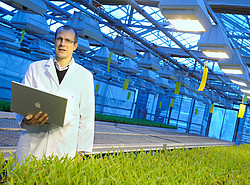
Good reasons to study at the Faculty of Agricultural Sciences in Hohenheim
First Place not Once but Three Times: The current Global Universities Ranking from U.S. News & World Report, the renowned NTU ranking, QS World University Ranking, and dathe Center of World University Ranking put University of Hohenheim’s agricultural research in 1st place in Germany.
In the agricultural university ranking from top agrar, the agricultural students at the University of Hohenheim give the grades 1.5 to 2.0. According to the ranking 2016, 88% of the students surveyed would recommend the University of Hohenheim for agricultural studies.
The University of Hohenheim puts great importance on quality teaching, which is demonstrated by several award-winning reform projects.
These projects include for example mobile teaching (German e-learning innovation and young scientists award (d-elina) in the category “Campus” at the BITKOM) or the ethics module, developed by the student group FRESH and awarded by the UN.

You can choose from more than 200 modules offered by the Faculty of Agricultural Sciences. Upon request, you can even select from all of the Master’s modules offered by the University of Hohenheim and the other cooperating universities.

The vision of the Faculty of Agricultural Sciences is a global agricultural system which is productive, environmentally-friendly and socially-minded, and which is in harmony with society’s demand for a multi-purpose orientation.
Agricultural research at the University of Hohenheim is focused on four areas:
- Food for all: Security of global food supply
- Hazard prevention: Climate change and scarcity of resources
- Beyond fossil fuels: Bioenergy and bio-based value-creation networks
- Diversity instead of monoculture: Genome Diversity in Agriculture
There are no easy answers to these kinds of questions. That is why agricultural researchers at the University of Hohenheim work across disciplinary boundaries, collaborating with colleagues in the natural sciences, business administration and economics, and the social sciences, for instance in bioeconomics, a field of research and teaching that will become even more important in the future. That collaboration also has an impact on teaching.
Number 1 in internationalization: In the current EU ranking U-Multirank, the University of Hohenheim has a top spot in internationalization.
The basis for this placing is the decades-long, global commitment of the Agricultural Sciences. Especially our tropics research with 10 professorships has made the University known around the world.
International opportunities for students:
- 80 partner institutions worldwide (40 of which are in the Erasmus+ program)
- Member of the Euroleague for Life Sciences - the network for Europe’s best
- scholarship programs for travel, research, and exchange
- Worldwide alumni network
- Studies according to international standards for excellence and international competitiveness of graduates
Professors of the Faculty of Agricultural Sciences are in high demand.
The top experts include:
 | Chair of the scientific advisory council Prof. Dr. Martina Brockmeier The German Council of Science and Humanities is considered the highest-ranking advisory committee on topics of science in Germany. Its scientific members are appointed by the Federal President. |
 | In the Bioeconomy Council Prof. Dr. Regina Birner The Bioeconomy Council is an independent advisory committee for the German federal government. The goal: to establish a cross-sectoral and bio-based economy in Germany that uses as few fossil raw materials as possible. |
Further members in important commissions and expert lists
- Prof. Dr. Iris Lewandowski and Prof. Dr. Joachim Müller are members of the BMBF scientific advisory council "Agricultural Systems of the Future”
- Prof. Dr. Enno Bahrs is member of the BMEL scientific advisory council for biodiversity and genetic resources
- Expert lists on various agricultural topics

Scholarship and awards for studies, final theses, travel, and attending conferences: Thanks to many supporters, the University of Hohenheim has an unusually extensive scholarship culture.
Around 100,000 Euros is the total amount of all scholarships and awards that are presented each year at the Dies academicus.
More than 700 hectares of test area: Among German universities, the University of Hohenheim owns the largest amount of property. For students, this means a lot of room for their own experiments, research, and a great deal of hands-on experience.
Also directly on campus: State institutes for transferring science into practice, the Hohenheim Gardens, and the German Agricultural Museum.

The future lack of experts and managers in the area of agriculture / nutrition / horticulture means students of agricultural will have good career prospects. This was shown by a 2015 study by the Bundesverband Agrar Ernährung Umwelt (VDL).

The University of Hohenheim is a university with a long tradition. You will experience a truly unique university atmosphere enriched by the Baroque palace, the historic gardens and parks, and modern architecture: In 2009, the University of Hohenheim was declared the most beautiful campus university in the state.
In 2017, Hohenheim's President Stephan Dabbert was chosen by the German Association of University Professors and Lecturers (DHV) as the most popular president in Baden-Württemberg for the third year in a row. He was ranked second in all of Germany.
This jewel is located south of the state capital Stuttgart. Because it is close to Stuttgart, you have all the opportunities available in a big city. The University of Hohenheim is only a few minutes away from the airport, the Stuttgart Trade Fair Centre, and the autobahn and is easily reached with public transportation.
 | Unique party atmosphere: The historical Thomas-Müntzer-Scheuer, an old barn with a new purpose, is the party center of Hohenheim. |
 | The University ball in the pompous palace rooms is the social event of the year. |
Interesting and individual career prospects
As a graduate of Transformation Management for Sustainable Agri-Food-Systems major in the Master’s program in Agricultural Sciences, you will be able to work with a variety of partners from different backgrounds and support complex transformation processes at different levels.
Typical employers include private companies, public institutions, non-governmental organizations, and projects in Germany or abroad that aim to develop existing structures, working methods, products, markets, and the like, especially in the area of food production, through intensive measures aiming at greater sustainability.
The following career paths are open to you:
- Sustainability management in companies and organizations
- Activities in non-governmental organizations (e.g., Bread for the World), associations (e.g., Bioland), and/or international organizations (FAO, etc.) that are active in environmental issues
- Ministries, government agencies in the area of the environment and agriculture
- Specialized journalism and public relations
- Scientific work in public research institutions in the agricultural and environmental field
The Transformation Management for Sustainable Agri-Food-Systems major in the Master’s program in Agricultural Sciences also qualifies students for a doctorate in many topics. In order to prepare yourself well for a very specific subject area, you can use the elective module area during your studies to enhance your profile. An above-average Master’s degree is usually a prerequisite for the doctorate.

Topics related to Transformation Management for Sustainable Agri-Food Systems
Students and Alumni
Semester fees, rent, costs of living - How much will studying cost you and how can you finance it? We have collected the most important information. more
If you choose to study in Hohenheim, you will have to look for a room or an apartment in the region. We can help you with this. more
| Application deadlines | |
|---|---|
| 1st subject-related semester | for the winter semester: 15 September (Germans, EU citizens) 15 March (non-EU citizens) |
Higher subject-related semesters | Application to a higher semester is possible for the winter semester (application deadline: German, EU citizens: 15 September, non-EU citizens: 15 March) and summer semester (application deadline: All applications: 15 January). |
| Requirements | |
|---|---|
| Formal requirements | The Transformation Management for Sustainable Agri-Food Systems major in the Master’s program in Agricultural Sciences focuses on the interactions of agricultural production with the environment and society. If you have completed a Bachelor’s degree with an agricultural or environmental science focus, this is the program for you.
|
| Content requirements | You should have the following interests and knowledge in addition to the formal criteria:
|
| Language skills |
|
| Pre-study internship | no |
| Selection procedure | |
|---|---|
| Selection criteria | None, the number of places is not limited However, an above-average average grade in the Bachelor’s program as well as a suitable previous degree program are admission requirements. For details, see the Admission Regulations (german | english).
|
| Selection interview | no |

